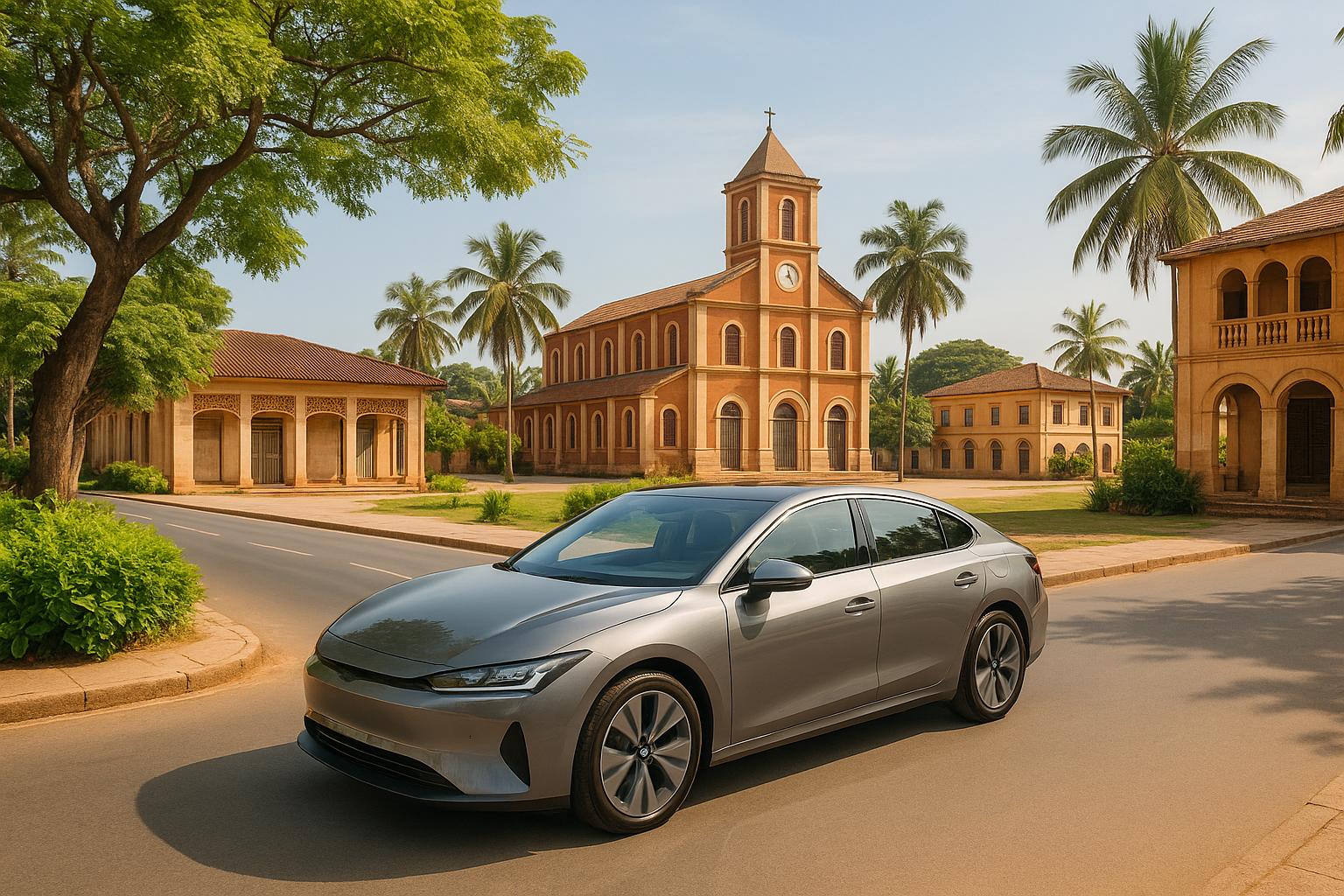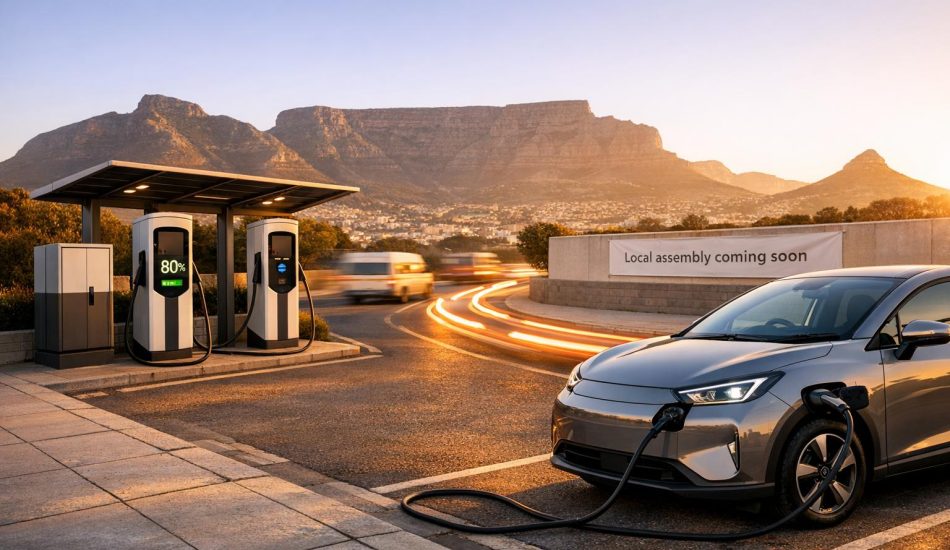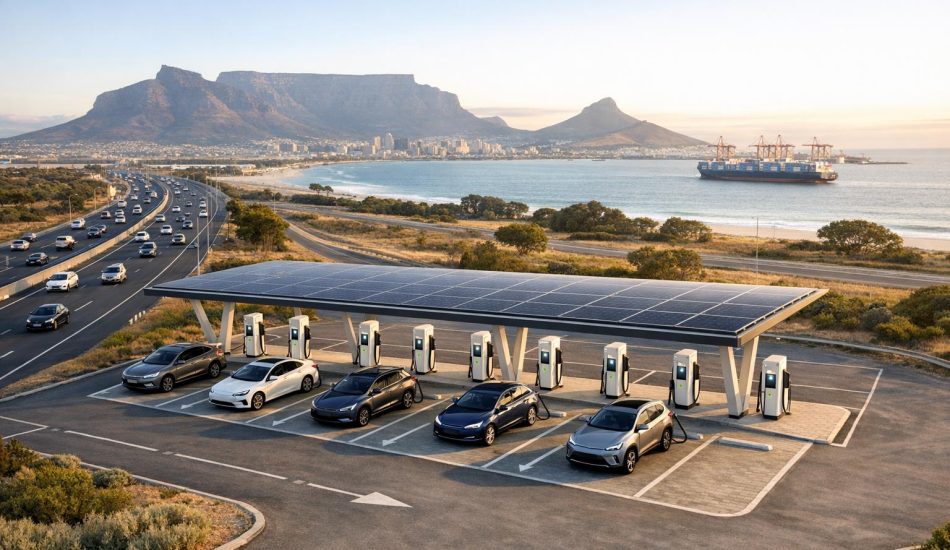
Porto-Novo, Benin’s capital, is stepping into the electric vehicle (EV) market with targeted government policies, international funding, and local initiatives. Here’s what you need to know:
- Current EV Status: Adoption is in early stages, with pilot programs and government fleets leading the way. Commercial use outpaces private ownership.
- Key Investments: $400M in international funding (World Bank & AIIB) and $6.1B in domestic resources focus on EV infrastructure, including solar-powered charging stations.
- Challenges: High upfront costs, unreliable power grids, limited financing, and lack of technical expertise hinder widespread adoption.
- Local Programs: The Grand Nokoué Sustainable Urban Mobility Project integrates electric buses, motorcycles, and boats, creating jobs and training operators.
- Private Sector Role: Platforms like EV24.africa simplify EV access with financing options, maintenance support, and logistics solutions.
Porto-Novo is building a model for EV growth in West Africa, leveraging policy, infrastructure, and public-private partnerships to address local challenges and expand access to electric mobility.
Rising popularity of electric motorbike taxis in Benin and Togo
Government Policies and Incentives
The Beninese government has taken on a leading role in promoting electric vehicle (EV) adoption in Porto-Novo. This dedication is evident in the implementation of targeted policies and strategic investments at both national and local levels.
National and Local EV Policies
Benin’s strategy for advancing EV adoption focuses heavily on building the necessary infrastructure. A key initiative in this effort is the Grand Nokoué Sustainable Urban Mobility Project, which targets Porto-Novo and its surrounding areas. This project aims to integrate electric vehicles into public transportation systems while creating infrastructure that supports both public and private EV use. Backed by significant international and domestic investments, the project is designed to modernize charging networks and improve grid reliability, laying the groundwork for a robust EV ecosystem.
Infrastructure Investment Impact
The scale of investment underscores Benin’s commitment to transitioning toward electric mobility. The World Bank has approved $200 million in International Development Association (IDA) financing for the Grand Nokoué Sustainable Urban Mobility Project, aimed at funding charging infrastructure and grid upgrades. Additionally, the Asian Infrastructure Investment Bank (AIIB) is set to provide another $200 million in 2025, bringing the total international funding to $400 million. This combined financial support signals strong international confidence in Benin’s EV ambitions and provides the resources needed for major infrastructure projects.
Beyond international aid, Benin is making substantial domestic investments in its transportation and urban infrastructure. The government has launched a five-year strategic plan through 2029, requiring $9.7 billion in funding – over half of which ($6.1 billion) will come from domestic sources. A significant portion of these funds is earmarked for off-grid solar-powered charging stations, addressing a critical obstacle to EV adoption. By integrating renewable energy sources into charging infrastructure, Benin is creating a sustainable EV framework that minimizes strain on the existing power grid.
Connection to Africa’s EV Goals
Benin’s efforts in Porto-Novo align seamlessly with broader African goals for sustainable transportation and renewable energy. The focus on solar-powered charging stations not only addresses local challenges, such as unreliable power grids, but also contributes to Africa’s renewable energy objectives. This approach demonstrates how EV adoption can support multiple sustainability goals at once, making Porto-Novo a model for other African cities looking to modernize their transportation systems.
Furthermore, Benin’s emphasis on domestic funding reflects a growing trend across Africa toward self-reliant sustainability initiatives. By combining local resources with international support, the country is fostering greater ownership of its EV transition while ensuring the economic benefits remain within its borders. These policies and investments are transforming Porto-Novo’s transportation landscape, paving the way for faster EV adoption and serving as a blueprint for sustainable urban mobility across the continent.
Infrastructure Development and Charging Network
The growth of electric mobility in Porto-Novo hinges on building a dependable and accessible charging infrastructure. While specific details about the existing network remain scarce, there’s a clear push toward creative solutions to tackle traditional challenges. Let’s break down the key aspects: charging station availability, power grid limitations, and the move toward solar-powered alternatives.
Charging Station Availability
Expanding the network of charging stations is a top priority, with plans targeting key locations to meet the growing interest in electric vehicles (EVs). This expansion aims to make EV ownership more practical and convenient for residents.
Power Grid Challenges
The reliability of the power grid has been a significant hurdle for grid-dependent charging stations. These issues have encouraged stakeholders to explore alternatives that don’t rely solely on the conventional grid, ensuring a more consistent charging experience.
Solar-Powered Solutions
To address these challenges, efforts are underway to establish off-grid, solar-powered charging stations. These stations promise a dependable and sustainable way to charge EVs, bypassing the constraints of the traditional power grid entirely. This innovative approach could play a pivotal role in making EV adoption more feasible in Porto-Novo.
Market Trends and Consumer Behavior
As Porto-Novo continues to develop its infrastructure, evolving consumer trends are shedding light on the growing interest in electric vehicles (EVs). While the market is still in its infancy, early signs suggest a gradual shift toward EV adoption, presenting both opportunities and challenges for stakeholders.
Market Size and Growth Forecasts
Porto-Novo’s emerging EV market is showing signs of growth, largely fueled by improvements in charging infrastructure and government-backed initiatives. Although city-specific data remains scarce, regional trends hint at increasing urban interest in EVs. The expansion of this market will likely hinge on sustained infrastructure upgrades and consistent governmental support. Early adopters appear to be concentrated in sectors like delivery services and short-distance commuting, where the promise of cost savings and operational efficiency is particularly appealing. These initial trends provide a foundation for understanding what drives consumer behavior in this space.
Consumer Motivations and Concerns
For many consumers in Porto-Novo, cost savings are a key factor in considering EVs. Small business owners, in particular, are drawn to the lower operating costs of electric vehicles, especially in the face of fluctuating fuel prices. However, concerns like range anxiety persist, even though most daily travel distances are relatively modest. Social perceptions of EVs are also evolving, with early adopters helping to reshape views on their reliability and overall appeal.
EV Adoption Barriers
Despite growing interest, several obstacles continue to hinder widespread EV adoption in Porto-Novo. One of the biggest challenges is the high upfront cost of electric vehicles compared to traditional gas-powered models, making them less accessible to middle-income consumers. Compounding this issue is the limited availability of specialized financing options, forcing many buyers to rely on cash, which can be a significant barrier.
Another concern is the lack of technical expertise for EV maintenance and repair, which raises doubts about long-term serviceability. The reliance on imported vehicles and components further complicates matters, creating uncertainties around cost stability and availability. Additionally, the prevalence of informal economic practices in Porto-Novo restricts many consumers from accessing conventional financing solutions, emphasizing the need for creative approaches to improve affordability and accessibility.
These trends highlight the pressing need for targeted interventions to address these barriers, setting the stage for exploring local initiatives and strategic recommendations aimed at fostering EV adoption in the city.
sbb-itb-99e19e3
Local EV Programs and EV24.africa‘s Role

In Porto-Novo, local initiatives are gaining momentum as they build on government policies and expanding infrastructure to promote electric vehicle (EV) adoption. These programs combine government backing, international funding, and private-sector expertise to address challenges like affordability, infrastructure, and operator training. Playing a key role in these efforts is EV24.africa, which extends the reach of these initiatives through its digital platform.
Community and Public-Private Projects
One standout initiative is the Grand Nokoué Sustainable Urban Mobility Project, which is reshaping urban transportation in Porto-Novo and nearby areas. Supported by a $200 million financing package from the World Bank, this project is integrating electric buses, motorcycles, and boats into a more climate-resilient public transport system. It also focuses on training operators from traditional motorcycle taxi fleets, known locally as zemidjan. So far, nearly 3,000 electric motorcycles are in operation, primarily in Cotonou. Partnerships with companies like M-Auto and Zed-Motors are instrumental in replacing traditional fleets with electric vehicles. To support this growing network, Porto-Novo now hosts 57 battery replacement centers. Beyond transportation, the project is expected to generate 17,000 jobs in areas like EV maintenance, charging infrastructure management, and related services.
EV24.africa’s Local Market Support
EV24.africa complements these local efforts by simplifying access to electric mobility solutions. Its online marketplace offers a wide range of electric vehicles, both new and used, with clear pricing and flexible financing options to make EVs more accessible. Covering all 54 African markets, the platform handles logistics like customs clearance and local registration, streamlining the buying process. To ease concerns about maintenance, EV24.africa provides expert technical support and after-sales services, including remote assistance and partnerships with local providers.
EV24.africa Impact Examples
The platform’s influence is particularly evident in its support for local delivery businesses. By offering bundled packages that include vehicles, charging solutions, and maintenance contracts, EV24.africa enables small businesses to transition smoothly from gas-powered vehicles to electric ones. Flexible installment plans and on-site support further simplify this shift, helping businesses lower their operating costs while boosting satisfaction. Additionally, through collaborations with local governments and community organizations, EV24.africa promotes educational workshops, pilot programs, and demonstration events. These initiatives build trust within the community and encourage consumer choices that align with national e-mobility goals. Together, these efforts are paving the way for the opportunities expected in 2025.
2025 Opportunities and Recommendations
This section builds on earlier discussions about policies and infrastructure to highlight practical opportunities and actionable recommendations for stakeholders. Porto-Novo’s recent efforts – ranging from new policies to investments and local programs – offer a clear roadmap for expanding electric vehicle (EV) adoption and tackling existing challenges. Below, we explore key growth opportunities and provide targeted suggestions to further boost EV adoption in Porto-Novo.
Key Growth Opportunities
One promising avenue is climate finance, which combines infrastructure improvements with operator training. This approach has the potential to attract increased international support.
Another opportunity lies in local assembly and manufacturing, which could lower EV costs while creating jobs. By encouraging local demand, assembly operations – such as producing battery packs – can reduce reliance on imports and strengthen the domestic market.
Expanding efforts to include private EV ownership could tap into the growing interest in two-wheelers and small passenger vehicles, meeting the needs of a broader consumer base.
Digital platforms also hold significant potential to streamline the EV ecosystem. Platforms like EV24.africa have already simplified vehicle acquisition, financing, and maintenance. Expanding these technologies to include features like energy management, route optimization, and predictive maintenance could help eliminate additional barriers to adoption.
Recommendations by Stakeholder
Governments
Governments should align policies and enhance incentives to encourage EV adoption. Local authorities can take the lead with city-specific measures such as preferential parking, reduced registration fees, expedited licensing, dedicated EV lanes, and clear guidelines for battery swapping. These steps can create a more supportive environment for EV users.
Private Companies
Businesses should focus on offering integrated services and forming local partnerships. For example, manufacturers and importers could provide bundled packages that include financing, maintenance, and charging solutions rather than simply selling vehicles. Setting up local service centers and training technicians can address consumer concerns, while energy companies should prioritize grid stability and renewable energy integration to ensure reliable charging infrastructure.
Consumers
Consumers have a role to play by making informed choices and engaging with their communities. Transportation and delivery business owners, in particular, should consider the total cost of ownership, including long-term savings, rather than concentrating solely on upfront expenses. Participating in pilot programs and demonstration events can help build hands-on experience, while forming buyer cooperatives may increase purchasing power and secure better terms for vehicle and charging service acquisitions.
Financial Institutions
Financial institutions can expand access to EVs by developing tailored financing products. Flexible payment terms that align with the income patterns of small business owners and motorcycle taxi operators can make EV ownership more accessible. Collaborating with platforms like EV24.africa to offer integrated financing solutions could simplify the purchase process and reduce financial risks.
Opportunities and Actions Summary Table
The table below outlines specific opportunities and suggested actions for each stakeholder group.
| Stakeholder | Key Opportunity | Recommended Action | Expected Outcome |
|---|---|---|---|
| Government | Policy alignment | Introduce city-specific incentives and infrastructure rules | Faster EV adoption through reduced barriers |
| Private Companies | Service integration | Offer bundled packages with vehicles, financing, and maintenance | Higher consumer confidence and smoother adoption |
| Consumers | Cost efficiency | Focus on long-term savings and join community programs | Lower operating costs and increased reliability |
| Financial Institutions | Flexible financing | Create payment plans suited to local income patterns | Broader market access and lower financial risks |
| Energy Sector | Grid updates | Invest in renewable energy and charging infrastructure | More reliable service and reduced costs |
| International Partners | Scaled climate finance | Expand successful local financing models | Greater impact through proven strategies |
Conclusion: EV Growth in Porto-Novo
Porto-Novo’s journey toward electric vehicle integration is a testament to how thoughtful planning, investment, and innovation can drive meaningful change. The city’s electric mobility initiatives, shaped by targeted policies and market-driven solutions, have positioned it as a leader in sustainable transportation within the region. The Grand Nokoué Sustainable Urban Mobility Project has laid the groundwork for this transformation by expanding infrastructure and integrating electric transport into the city’s fabric.
The results speak volumes: the creation of 17,000 jobs and 270,000 daily users during the project’s first phase highlight its tangible impact on both the economy and everyday life. BYD‘s market entry in April 2025, featuring the Yuan Plus SUV and Seagull hatchback, coupled with robust after-sales support, reflects growing consumer trust and a maturing market. Meanwhile, Spiro‘s launch of Benin’s first Automated Battery Swap Station in February 2024 tackled range anxiety head-on, with plans to establish 50 more stations across Africa showcasing how local solutions can scale successfully.
Platforms like EV24.africa have further simplified access to electric mobility, breaking down barriers like pricing and logistics. By offering transparent pricing, streamlined shipping, and access to major brands such as Tesla, Volkswagen, and XPeng, the platform supports local market growth while providing expert advice and flexible payment options. This approach ensures that electric vehicles are within reach for a broader audience across Porto-Novo and beyond.
Looking ahead, Porto-Novo’s strategic efforts provide a roadmap for sustainable urban mobility across West Africa. By integrating multimodal electric transport, fostering local assembly and maintenance industries, and formalizing informal transport operations, the city is setting an example of how comprehensive planning can accelerate EV adoption while delivering economic benefits.
This success highlights the importance of collaboration among governments, industries, and communities. As Porto-Novo continues to expand its charging infrastructure and promote e-motorcycles, the foundation laid in 2025 positions it as a model for electric vehicle adoption. The city demonstrates how emerging markets can embrace sustainable transportation while empowering local economies and addressing the unique challenges of their regions.
FAQs
What challenges does Porto-Novo face with electric vehicle adoption, and what steps are being taken to overcome them?
Porto-Novo is grappling with several hurdles in its shift toward electric vehicles (EVs). The city currently faces a lack of charging stations, the steep initial cost of EVs, and a limited pool of technicians trained to handle EV maintenance and repairs. These challenges present significant roadblocks to the adoption of electric mobility.
In response, the government has rolled out measures to encourage EV adoption. These include tax breaks and exemptions on import duties for EVs, making them more accessible to residents. Plans are also in motion to set up solar-powered charging stations that operate off the grid, tapping into the region’s plentiful sunlight to expand the charging network. On top of that, efforts are underway to train local workers in EV manufacturing and repair, creating a skilled workforce to support the industry as it grows.
What impact will the Grand Nokoué Sustainable Urban Mobility Project have on job creation and economic growth in Porto-Novo?
The Grand Nokoué Sustainable Urban Mobility Project is set to bring about 17,000 new jobs to Porto-Novo. These roles will span areas like maintaining electric vehicles, building infrastructure, and overseeing transportation regulations.
Beyond job creation, this project aims to boost the local economy by developing a more efficient and sustainable urban transit system. It highlights a strong dedication to advancing electric mobility in the region while tackling pressing urban transportation issues.
How does EV24.africa help promote electric vehicle adoption in Porto-Novo and make EV ownership easier?
EV24.africa is making waves in Porto-Novo by simplifying the journey to owning an electric vehicle. Their platform offers a straightforward way to purchase EVs, including well-known models like Tesla and BYD. From shipping and customs clearance to registration, they handle all the details, ensuring a smooth experience for buyers.
By providing clear pricing and extensive support, EV24.africa tackles common challenges that often deter people from switching to electric vehicles. This makes EV ownership more approachable for both individuals and businesses, helping to drive the shift toward cleaner, more sustainable transportation in the region.




